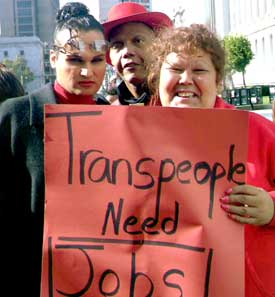Abused transgender parolee sues prison
By
Judy Greenspan
San Francisco
Published Aug 10, 2007 7:53 PM
Aug. 2—The California Department of Corrections and Rehabilitation (CDCR)
is in the hot seat these days: its health-care management is under federal
receivership and a panel of judges just promised to begin reviewing prisoner
release options due to dangerously overcrowded conditions. Even though her
trial ended today with a hung jury, a courageous lawsuit by Alexis Giraldo, a
Puerto Rican transgender woman prisoner, increased that heat by exposing the
daily rape, sexual abuse and inhumane treatment of transgender, gender variant
and intersex prisoners in this state.
|
Leaders of the fight for justice for
transgender
prisoners gather outside the
courthouse
on July 30. Left to right:
Alexis Giraldo, Ms.
Major and Kelani.
WW photo: Judy Greenspan
|
Not only did Giraldo bravely stand up to the racist, homophobic and
transgender-phobic prison system, but her case has also inspired and energized
hundreds of transgender and other human rights activists in the state.
Yesterday, approximately 100 supporters held a silent vigil outside the federal
courthouse. Demonstrators placed tape over their mouths to dramatically protest
the prison system’s refusal to stop the violence against transgender
prisoners. The protest was organized by the Trans/Gender Variant in Prison
Committee (TIP).
Giraldo was sent to Folsom prison in January 2006 for shoplifting and a parole
violation. She was placed in general population in a men’s prison for
three months. There she was held captive in the cell, raped and sexually
assaulted by cellmates. She had made several attempts to alert prison guards
and medical staff, but her cry for help was not taken seriously. Finally, after
being violently attacked with a box cutter by one of her cellmates, she was
placed in isolation and eventually moved to a prison designated for transgender
prisoners.
Giraldo’s lawsuit against the California Department of Corrections and
Rehabilitation and the guards directly involved with the incident sought to
bring about changes in the housing and overall treatment of transgender
prisoners. According to the TGI (Transgender, Gender Variant and Intersex)
Justice Project, transgender prisoners experience human rights violations on a
daily basis. Besides sexual assault and rape, TGI prisoners also face physical
brutality, medical neglect, constant verbal abuse and discrimination.
The trial, which began on July 17, was attended every day by Giraldo, who was
paroled from prison just days before it started. Giraldo, despite the
state’s best attempts to humiliate her and dismiss her claims, took the
stand and courageously testified in open court. Her presence every day in the
courtroom was inspirational according to several TIP activists.
Expert witnesses also exposed the inhumane treatment of transgender prisoners.
Valerie Jenness, a University of California—Irvine criminologist who
recently studied sexual assaults in this state’s prisons (for the prison
system), testified at the trial that 59 percent of the state’s
transgender prisoners have reported being sexually assaulted, compared with 4
percent of the general population. The CDCR apparently doesn’t even read
its own reports and studies.
According to Ms. Major, a transgender activist and former prisoner, this case
exposed the truth about the treatment of transgender prisoners. “There is
a myth that we [transgenders] have a good time in prison and that’s not
the case at all. We are abused, raped and humiliated,” Ms. Major, the TIP
community organizer, stated.
Giraldo and her attorney Greg Walston have not decided whether to appeal the
hung jury and ask for a new trial. Whatever the legal outcome, transgender
activists in TIP and the TGI Justice Project are encouraged by the large
community outpouring in support of Giraldo and will continue their efforts to
support transgender prisoners.
According to Ms. Major, this trial was significant because it brought to light
the atrocities and exposed the truth. “At least now no one can say they
didn’t know,” the transgender organizer concluded.
Articles copyright 1995-2012 Workers World.
Verbatim copying and distribution of this entire article is permitted in any medium without royalty provided this notice is preserved.
Workers World, 55 W. 17 St., NY, NY 10011
Email:
[email protected]
Subscribe
[email protected]
Support independent news
DONATE


